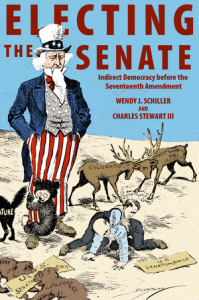
Electing the Senate Princeton University Press
This website acts as a supplement to our book: Electing the Senate: Indirect Democracy Before the Seventeenth Amendment (Princeton University Press) which is an original and systematic account of how U.S. Senators were chosen – not by the people directly – but by their elected representatives in state legislatures.
Searchable Data Bases. Through the Senate Elections Data Project 1871-1913, Brown University hosts the searchable digital archives of the pages from state House and Senate journals that list the roll call votes for U.S. senators in state legislatures for each state.
The amount of data is vast – we have over 577,000 roll call votes collected from the 48 states which existed during the period of our study. This website is hosted by Brown University and we have posted the roll call data files by state, for 24 states, including year, seat year, type of election, chamber, joint ballot number, U.S. Senate candidate name, state legislator name and vote choice, and where available, state legislator party, district, and county. If you are seeking the data from the other 24 states, please contact Professor Charles Stewart III at MIT.
We hope that this website makes our research interactive and accessible, as well as inspires further conversation and debate on the promise and failure of the 17th Amendment.
Politicians Electing Politicians: The Old Road to the U.S. Senate
The public has not always elected U.S. Senators. The popular stage on which U.S. Senators walk, and their place in modern politics, makes it easy to forget that for the first half of the Senate’s history, senators did not derive their electoral mandates from the people—at least not directly—but instead from state governments, acting through their state legislatures. The founders chose to elect members of the upper chamber of the people’s branch indirectly. This suggests that they considered indirect election to be noble, functional, and practical. A century and a quarter later, in 1913, the 17th Amendment to the U.S. Constitution was ratified to provide for election directly by the public.
Advocates of the 17th Amendment argued that the indirect mode of election was unsavory, unworkable, and ineffective. Changing the Constitution to improve democracy is no small matter. Supporters of direct elections promised that changing the way we elect U.S. Senators would improve responsiveness and efficacy in government. In this project, we have tried to assess the extent to which the goals of the 17th Amendment – empowering voters in the choice for U.S. Senator and reducing the corrosive effects of money and machine party power – have been met. We are the first to comprehensively go back in time and systematically explore exactly how these elections worked in state legislatures, and detail the key players in Senate elections under the indirect system, from ambitious politicians seeking to win Senate seats, to political party organizations, to business interests, and to state legislators themselves. In doing so, we provide a new opportunity to understand electoral design, legislatures, parties, and political ambition.
We find many similarities between the direct elections system of today and the indirect election system that existed before the 17th Amendment. Senate career paths, political competition, incumbency advantage, the role of money in Senate elections, and limited Senate responsiveness have more in common across time than reformers would have expected. If in fact changing the way we elect our U.S. Senators did not substantively improve representation, it may serve as a caution to those who wish to change the Constitution to reform elections, and government more generally.
